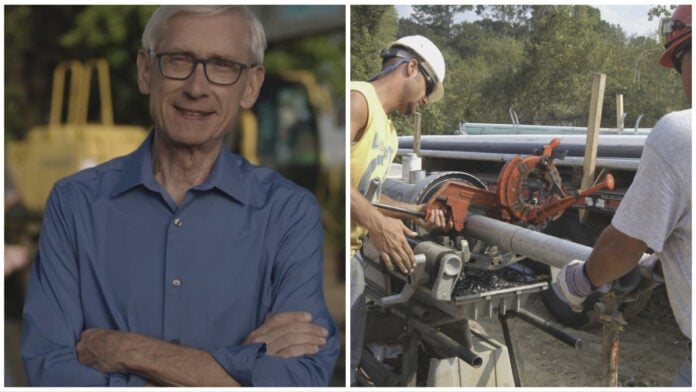Evers “doesn’t want the public to see how inept his administration is” – Scott Manley, executive vice president of the Wisconsin Manufacturers and Commerce.
Gov. Tony Evers doubled down on secrecy when it comes to state government’s effectiveness on Friday, vetoing bills that would have required more transparency, statistics, and disclosure around the state’s messed-up licensing process, Milwaukee jobs programs, and Department of Corrections’ programs to reintegrate criminals to society.
In addition, Evers vetoed unemployment bills that “sought to allow employers to report benefits recipients who either turn down or don’t show up to a job interview,” the AP reported. ” The measures also proposed requiring the Department of Workforce Development to audit more work-search activities and increase drug testing for certain occupations.”
In short, Evers’ actions will make it harder for the public to analyze how well he – and the state agencies underneath his authority – are doing their jobs. In April 2023, Wisconsin Public Radio reported that the state’s Department of Safety and Professional Services had a backlog of 2,500 pending license applications for nurses and other professionals, who can not work in those professions without them.
Republican lawmakers have repeatedly pressed Evers on the licensing backlog, and it was an issue in the governor’s race. In February, Republicans said the average wait time “for a license to be approved or denied was 45 days,” WPR reported. The MacIver Institute and conservative journalist Matt Kittle have been raising the issue since at least 2017. “Getting a license in this state has been a nightmare,” a man trying to become a master plumber in Wisconsin told them.
Evers’ vetoes immediately met with criticism. “Today Evers vetoed a government transparency bill that would’ve required him to publish how many occupational licenses are backlogged, and the average time it takes to issue them. He doesn’t want the public to see how inept his administration is,” tweeted Scott Manley, executive vice president of the Wisconsin Manufacturers and Commerce.
Specifically, Evers announced that he had vetoed:
This bill would require the Department of Safety and Professional Services to “post and update specific information on its website for each license, permit or certificate that it issues every month.”
The metrics would have to be posted for:
“The median number of days from the day that all required application fees for an initial, renewal or reciprocal credential application are submitted to the date a final determination is made.”
“The number of initial, renewal or reciprocal credential applications submitted over the prior month.”
“The number of final determinations made on initial, renewal and reciprocal credential applications over the prior month.”
“And the number of initial renewal and credential applications for which more than 45 days have passed since the applicant submitted all required fees.”
Evers said he believed the metrics were “arbitrary” and would not offer “meaningful information to applicants.”
This bill, as Evers described, would “require the Department of Safety and Professional Services to report on various statistics related to the issuance of occupational credentials in its biennial report to the Legislature.”
The required statistics would have included:
“The number of applications the department or any credentialing board receives for initial, renewal and reciprocal credentials, and the total number of those issued.”
“The lowest, highest, and median number of days from the date a credential application is initiated to the date a determination is made.”
“The median number of contacts made to and received from an applicant for an initial, renewal or reciprocal credential before a final determination is issued.”
“The number of applications for initial, renewal and reciprocal credentials for which the department or a credentialing board requested more information.”
“The number of applications for initial, renewal and reciprocal credentials that required the department or a credentialiing board to review an arrest, conviction or other offense record.”
Evers said he was vetoing the bill because he objected that the Legislature “requiring the department to provide arbitratry metrics” that would divert resources.
As Evers noted, this bill would require that state agencies and authorities that “coordinate, oversee or operate workforce development programs” track and report the performance of each program using performance indicators similar to those used in federal Workforce Innovation and Opportunity Act reporting.”
The bill specified that the following programs would fall under the definition of workforce development program:
Transform Milwaukee Jobs and Transitional Jobs programs
Initiatives offered by the Department of Corrections that reintegrate offenders
Employment and training programs administered by the Department of Children and Families
The Wisconsin Works program administrated by the Department of Children and Families
Evers wrote that reforms to “change or restrict assistance programs” are “not a silver-bullet solution to our state’s workforce challenges.”
See all of Evers’ vetoes here.






![Protecting Portland: No Good Deed Goes Unpunished [REVIEW]](https://www.wisconsinrightnow.com/wp-content/uploads/2025/07/portland-356x220.jpg)
























